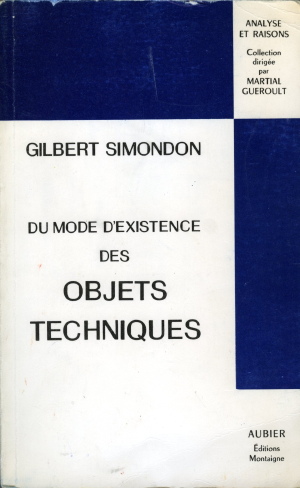
About two years ago I discovered this book more or less by chance:
Gilbert Simondon, “Du Mode d’Existence Des Objets Techniques”, Aubier/Montaigne, Paris, 1958
Only to discover that it is less obscure than I thought, but mostly known due to its influence on Deleuze. I’m probably one of the very few mortals left who have managed to never read Deleuze (since he is read by so many, I figure I might as well read other things..), but Simondon is amazing. It blew me away and it’s only because of lack of time that I have not been able to read more of him or about him. It’s insane that this book has not been translated into English, there is a partial translation from 1980 that has never been published. While preparing a course I looked at it again and its introduction reads like it could be my manifesto:
“Culture has become a system of defence designed to safeguard man from technics. This is the result of the assumption that technical objects contain no human reality. We should like to show that culture fails to take into account that in technical reality there is a human reality, and that, if it is fully to play its role, culture must come to terms with technical entities as part of its body of knowledge and values. Recognition of the modes of existence of technical objects must be the result of philosophic consideration; what philosophy has to achieve in this respect is analogous to what the abolition of slavery achieved in affirming the worth of the individual human being.
The opposition established between the cultural and the technical and between man and machine is wrong and has no foundation. What underlies it is mere ignorance or resentment. It uses a mask of facile humanism to blind us to a reality that is full of human striving and rich in natural forces. This reality is the world of technical objects, the mediators between man and nature.
Culture behaves towards the technical object much in the same way as a man caught up in primitive xenophobia behaves towards a stranger. This kind of misoneism directed against machines does not so much represent a hatred of the new as a refusal to come to terms with an unfamiliar reality. Now, however strange this reality may be, it is still human, and a complete culture is one that enables us to discover that this stranger is indeed human. Still, the machine is a stranger to us; it is a stranger in which what is human is locked in, unrecognized, materialized and enslaved, but human nonetheless. The most powerful cause of alienation in the world of today is based on misunderstanding of the machine. The alienation in question is not caused by the machine but by a failure to come to an understanding of the nature and essence of the machine, by the absence of the machine from the world of meanings, and by its omission from the table of values and concepts that are an integral part of culture.”
(from the 1980 translation by Ninian Mellamphy)
This quote is from an ‘artist’s statement’ I wrote around 1999:
“Instead of a neutral means to an end, technology is a part of our culture just like art or mythology. In the history of technology specific motives recur in ever changing constellations, motives which often originated in philosophy or art. Also the contemporary disgust or devotion to technology stands in no proportion to the supposed mere functionality of it. The rift that many perceive between the world of ‘cold’ functional science and technology, as opposed to the ‘human’ world of art and intuition, is in my opinion based on a dangerous misconception. The full exposure of the sensory and human aspects of technological motives has gradually become one of the main aims of my work.”
